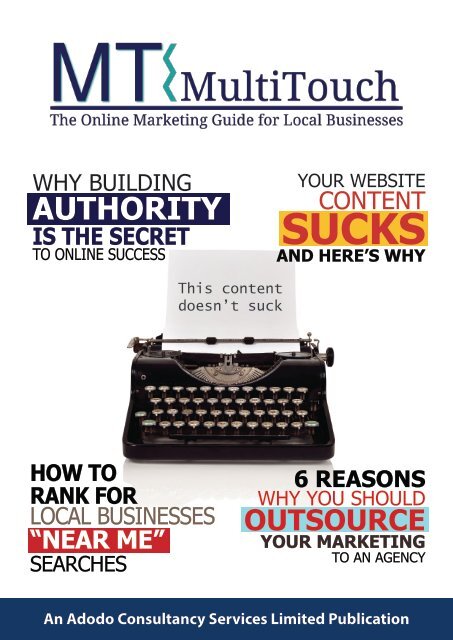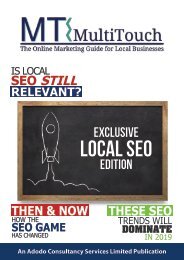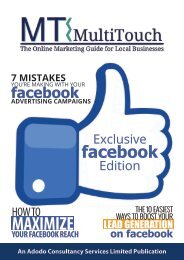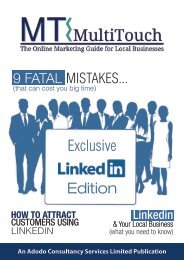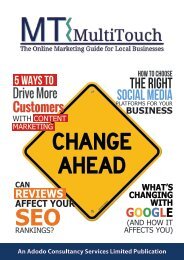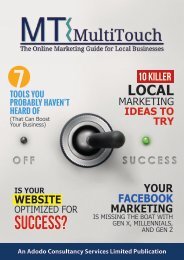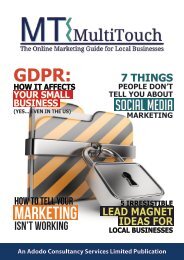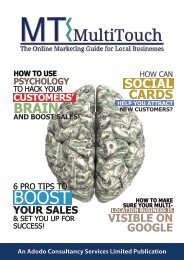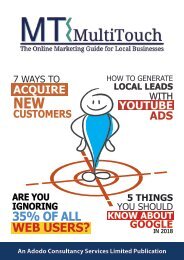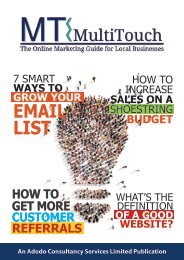mt-magazine-Apr18
Create successful ePaper yourself
Turn your PDF publications into a flip-book with our unique Google optimized e-Paper software.
WHY BUILDING<br />
AUTHORITY<br />
IS THE SECRET<br />
TO ONLINE SUCCESS<br />
YOUR WEBSITE<br />
CONTENT<br />
SUCKS<br />
AND HERE’S WHY<br />
This content<br />
doesn’t suck<br />
HOW TO<br />
RANK FOR<br />
LOCAL BUSINESSES<br />
“NEAR ME”<br />
SEARCHES<br />
6 REASONS<br />
WHY YOU SHOULD<br />
OUTSOURCE<br />
YOUR MARKETING<br />
TO AN AGENCY<br />
An Adodo Consultancy Services Limited Publication
Contents<br />
Why Building Authority is the<br />
Secret to Online Success<br />
Here’s a secret that a lot of<br />
entrepreneurs don’t know: Authority<br />
is not something other people<br />
bestow on you. It’s something you can<br />
build. That might surprise you. But it<br />
shouldn’t. Why is authority important? It’s very simple. When you<br />
have authority, people listen to what you say. They value your<br />
opinion – and when you tell them to buy something, they’re<br />
likely to do it.<br />
Your Website Content Sucks and<br />
Here’s Why<br />
Your website content sucks. Ouch.<br />
That’s painful to hear, but it’s also<br />
probably true. But you’re not alone.<br />
Most small business website content<br />
sucks. The good news is, you can make<br />
it not suck. The most difficult part is evaluating your content with<br />
a critical eye and acknowledging that it’s not working. Here are<br />
seven signs that your content isn’t pulling its weight.<br />
How to Rank for Local<br />
Businesses “Near Me” Searches<br />
Google Searches have changed a lot<br />
in the last four years. Mobile searches<br />
have overtaken desktop searches and<br />
Google has prioritized local searches<br />
over non-local. These two factors,<br />
combined with a rise in voice search, have changed the ballgame<br />
when it comes to ranking for local searches on Google. Understanding<br />
what factors influence “Near Me” results can give you<br />
an edge.<br />
6 Reasons Why You Should Outsource<br />
Your Marketing to an Agency<br />
03<br />
08<br />
13<br />
18<br />
If you’re an inexperienced marketer,<br />
and trying to grow your presence online<br />
it’s a virtual certainty that you’re<br />
missing opportunities – and sales<br />
– because of the marketing choices<br />
you’re making… Yikes! Most small and medium-sized business<br />
can’t afford to give sales away. So, with that in mind, let’s talk<br />
about how you can tell if it’s time to outsource your marketing<br />
to an agency.<br />
Welcome To MT<br />
Thanks for checking out the latest<br />
edition of MT, your online marketing<br />
resource guide for local businesses.<br />
Each month we will be covering topics<br />
that resonate with local businesses<br />
just like yours.<br />
Our goal is simple. We want to<br />
enable you to do big things online,<br />
and it all starts by breaking down<br />
the complexities of marketing your<br />
business online.<br />
It doesn’t matter if you are just starting<br />
out, or an established business owner<br />
in your local community, you can<br />
always benefit from increasing your<br />
brand’s visibility online.<br />
To your Success,<br />
Tim Glynn<br />
CEO and head of fun<br />
MT IS BROUGHT TO YOU BY<br />
Adodo Consultancy Services, the leading<br />
small business marketing service dedicated<br />
to putting reputation marketing at the heart<br />
of a local businesses marketing strategy. We<br />
help small businesses connect with more<br />
customers online.<br />
If you want to build your business, you need<br />
to market, it’s that simple. But you can lose<br />
thousands of dollars if you don’t know what<br />
you are doing. So we urge you to take action<br />
with some of the strategies we recommend.<br />
Feel free to reach out to us at any time.
WHY BUILDING AUTHORITY IS THE<br />
SECRET TO ONLINE SUCCESS<br />
Who are you and why should anybody care<br />
what you think?<br />
If you can’t answer that question in a compelling<br />
manner, then you’re probably not an<br />
authority figure in your niche.<br />
Maybe you’re just starting out. Or, maybe<br />
you’ve been in the game a while, but you’re<br />
having a hard time getting people to pay attention<br />
to you.<br />
into an authority.<br />
Here’s the secret that a lot of entrepreneurs<br />
don’t know:<br />
Authority is not something other people bestow<br />
on you. It’s something you can build.<br />
That might surprise you. It shouldn’t. The people<br />
you view as authorities created their authority<br />
by their actions. And you can too.<br />
Either way, the solution is to make yourself
WHY AUTHORITY MATTERS<br />
Why is authority important? It’s very simple.<br />
When you have authority, people listen to what<br />
you say.<br />
They value your opinion – and when you tell<br />
them to buy something, they’ll do it.<br />
So, when they recommended a cough<br />
syrup or headache medication, people<br />
trusted those recommendations.<br />
Another way of looking at it is that authority<br />
is based on trust. If you do a<br />
good job building authority, people will<br />
trust you and your products.<br />
That’s why authority is one of Robert Cialdini’s<br />
principles of influence. Psychologically speaking,<br />
people are inclined to do what an authority<br />
figure tells them to do – even if they wouldn’t<br />
do it on their own.<br />
A simple example of this principle in action<br />
comes from television advertising. Maybe you<br />
remember those commercials featuring wellknown<br />
actors.<br />
They always started with something like this:<br />
I’m not a doctor, but I play one on TV.<br />
You might think of that as a disclaimer, but it’s<br />
a statement of authority. People were accustomed<br />
to thinking of those actors as doctors.
BRANDING AND AUTHORITY<br />
You’ll build authority more quickly if you define<br />
your brand and present it in a consistent way in<br />
all your online marketing.<br />
Why? Because authority is easier to build if you<br />
have a narrowly defined area of expertise. Nobody<br />
is equally knowledgeable about everything,<br />
right?<br />
Of course, there are exceptions. Someone like<br />
Oprah is so well known that people might take<br />
her word for just about anything. She can present<br />
herself as an authority on self-help, alternative<br />
medicine, clothing, and books because she<br />
has achieved a level of authority that allows it.<br />
Most of us can’t do that. We need to define our<br />
niches and stick to them.<br />
Here are some ways you can create a consistent<br />
and authoritative brand:<br />
of you and your brand and create your<br />
brand personality and voice around<br />
those things.<br />
2. Create a customer persona and use<br />
it to create your online content that<br />
will appeal to your target audience.<br />
3. Use the same colors, language, and<br />
voice everywhere your brand is rep<br />
resented online. That includes your<br />
website, social media accounts, email<br />
marketing, and in your comments on<br />
review sites and forums.<br />
4. Don’t let yourself get distracted by<br />
things that aren’t related to your brand.<br />
You shouldn’t be sharing the latest viral<br />
video on your Facebook page unless<br />
it’s relevant to your followers. Save<br />
those things for your personal page.<br />
Think of your brand as the cornerstone<br />
of your authority.<br />
1.. Understand how you want people to think
AUTHORITATIVE CONTENT<br />
Every piece of content you create for your<br />
brand must be authoritative. That means that<br />
everything on your website, online profiles, social<br />
media accounts, ads, and marketing videos<br />
must be conceptualized and executed with authority<br />
in mind.<br />
It all starts with your website. You need a professional<br />
site that uses clear and authoritative language<br />
designed to appeal directly to your target<br />
audience. It should be easy to use and provide<br />
immediate value to the people who visit it.<br />
The same is true of your social media content.<br />
Every status update, Tweet, or photo you post<br />
must be relevant to your brand and presented<br />
with authority.<br />
You may also want to consider creating<br />
long-form authoritative content to build<br />
authority. Examples include:<br />
> Exclusive content<br />
> White papers<br />
> Case studies<br />
> How-to guides<br />
Any of these can help you demonstrate<br />
your authority.
AUTHORITATIVE OPINIONS<br />
If you watch cable news, you know that one<br />
of the ways they fill the 24-hour news cycle is<br />
by booking authority figures to offer opinions<br />
about current events.<br />
Think about it. Every political consultant, pollster,<br />
or retired general is there for one reason.<br />
They have experience and knowledge that is<br />
applicable to a story, and because of that, they<br />
are viewed as authorities whose opinion is<br />
worth hearing.<br />
You can build the same kind of authority online<br />
by being opinionated. That doesn’t mean you<br />
should spout about politics (unless that’s related<br />
to your brand, of course.) What it does mean<br />
is that you shouldn’t be afraid to say what you<br />
think.<br />
One very effective way to do that is to curate<br />
content for your social media pages. Curated<br />
content is content that somebody else created.<br />
You can find it by following:<br />
> General news outlets and publications<br />
> Industry-specific publications<br />
> Popular bloggers in your niche<br />
> Popular brands in your niche<br />
It’s not enough to share curated content without<br />
commenting on it. That won’t help you<br />
build authority. Instead, read or watch everything<br />
you share and then offer an opinion<br />
about it.<br />
For example, say you find an article that<br />
lists ten essential things about your industry.<br />
You might feel that the writer left out<br />
something important. You should point<br />
that out when you post the article.<br />
Taking a controversial stance can be a good<br />
thing, too. When you contradict or rebut<br />
something that an established authority<br />
says, you’re putting yourself on their level.<br />
The key here is to sound confident when<br />
you offer an opinion. If you seem uncertain,<br />
people will dismiss your opinion.<br />
THERE’S ONE MORE THING…<br />
The final step to building authority is to put<br />
these things together and use them to create<br />
marketing campaigns that convert. If<br />
you do it right, you’ll set yourself apart from<br />
other brands in your niche.<br />
In other words, you won’t just be one option<br />
for people seeking products or services<br />
in your niche. You’ll be the only option<br />
– and all because they view you as an<br />
authority figure.
YOUR WEBSITE CONTENT<br />
SUCKS<br />
AND HERE’S WHY<br />
Your website content sucks.<br />
Ouch.<br />
That’s painful to hear, but it’s also probably true.<br />
But you’re not alone. Most small business website<br />
content sucks (from a marketing perspective).<br />
It’s badly conceived, poorly written, boring, and<br />
– worst of all – ineffective.<br />
Double Ouch.<br />
The good news is, you can make it not suck.<br />
It’s not even that hard. The most difficult part is<br />
evaluating your content with a critical eye and<br />
acknowledging that it’s not working.<br />
Once you’ve done that, it’s within your reach to<br />
create compelling and persuasive content that<br />
will get results.
#1:<br />
IT’S STALE AND OLD<br />
The first sign that your content<br />
isn’t up to snuff is if it hasn’t<br />
been updated in a while. Look<br />
at your website. Is your content:<br />
> Out of date?<br />
> Stagnant?<br />
> Been the same for more<br />
than a year, or years?<br />
These are all signs that your<br />
content is staler than last<br />
week’s loaf of bread. Google<br />
prioritizes fresh content, and<br />
so do web users. Your content<br />
must be updated regularly to<br />
stay relevant.<br />
#2:<br />
IT’S NOT AS GOOD AS<br />
YOUR COMPETITORS’<br />
CONTENT<br />
The second sign that your<br />
content needs refining is if<br />
it’s not measuring up to your<br />
competitors’ content. You<br />
should be looking at your<br />
competitors’ sites and social<br />
media pages regularly, so you<br />
know what they’re doing.<br />
If they’re blogging and you’re<br />
not – or if they’ve recently revamped<br />
their website – your<br />
stale site isn’t going to be able<br />
to compete. It’s time for considering<br />
an update.<br />
#3:<br />
IT DOESN’T CLEARLY<br />
DEFINE YOUR UNIQUE<br />
SALES PROPOSITION<br />
What’s so special about your<br />
business and what it has to offer?<br />
If your content isn’t doing<br />
a great job of identifying your<br />
USP so that prospects know<br />
why they should choose your<br />
product, your content is letting<br />
you down.<br />
One of the key jobs of online<br />
content is to differentiate one<br />
brand from another. You can’t<br />
expect people to buy your<br />
products unless your content<br />
gives them a reason to do so.<br />
#4:<br />
YOU’RE NOT USING YOUR<br />
CONTENT TO GENERATE LEADS<br />
Is your content helping you attract<br />
new site visitors and get them to optin<br />
to your list? If it isn’t, that’s a sure-fire<br />
sign that your content sucks.<br />
It’s rare for a prospect to visit a site and<br />
make a purchase the first time. It requires<br />
repeated contact with a brand to<br />
convert a lead into a paying customer.<br />
Your content should be compelling<br />
enough to get people to give you their<br />
email addresses to get it – so you can<br />
follow up and nurture them.
#5:<br />
YOUR CONTENT IS A SNOOZE<br />
You might know a lot about your niche. You<br />
might even be the most knowledgeable person<br />
around – but it won’t matter if your content is<br />
boring.<br />
A lot of entrepreneurs post regular blog posts<br />
that are effective only if readers are looking for a<br />
cure for their insomnia. Your blog posts (and all<br />
your other content) must be highly compelling,<br />
entertaining, and useful if you want people to<br />
buy your products.<br />
What do you want people to do when they visit<br />
your page or view your social media content? If<br />
it’s not obvious, then the chances are good that<br />
they’re not doing it.<br />
You’d think by now that every entrepreneur<br />
#3:<br />
YOU’VE OMITTED A CALL TO ACTION<br />
would know the importance of including a call<br />
to action in their content – and yet, a lot of<br />
them don’t do it. Every page (and every post)<br />
must have a compelling CTA that tells the reader<br />
or viewer what to do next.
HOW TO CREATE<br />
CONTENT THAT<br />
DOESN’T SUCK<br />
1. 2. 3.<br />
Audit your website and<br />
identify stale content. The<br />
first step is to review every<br />
page of your site and identify<br />
content that’s old, outof-date,<br />
irrelevant, or stale.<br />
It may be that every page<br />
needs an update.<br />
Make a list of your<br />
top competitors and<br />
review their websites<br />
and social media pages.<br />
What are they doing<br />
that you’re not?<br />
Which content is getting<br />
the most engagement?<br />
Take notes and<br />
don’t be afraid to use<br />
their content as an inspiration<br />
for your own.<br />
Evaluate your branding<br />
and make sure you<br />
know your USP. It should<br />
be your guiding light as<br />
you revamp your content.<br />
Every piece of content<br />
you create must<br />
speak to that USP and<br />
make it clear to new and<br />
repeat visitors.<br />
4. 5.<br />
Create a content plan for your website.<br />
What do you need? Can you create<br />
it yourself or do you need to hire<br />
a pro? Web design is easier than ever<br />
before, but that doesn’t mean you<br />
shouldn’t hire a professional designer.<br />
You should also consider hiring a professional<br />
writer.<br />
If you’re not already blogging,<br />
start a blog – and come up with<br />
compelling, relevant topics that will<br />
appeal to your target audience. Remember,<br />
you can look at your competitors’<br />
blogs for ideas.
6. 7.<br />
Create a lead magnet to generate<br />
leads. A lead magnet is usually a<br />
piece of long-form content that you<br />
give away to get people to complete<br />
your opt-in form. It might be a whitepaper,<br />
eBook, or case study. The key is<br />
to make sure that it’s valuable to your<br />
target audience.<br />
Make sure every page of your site<br />
has a CTA. The same goes for your<br />
social media posts. Nothing you post<br />
should be without a CTA – and the<br />
more directly relevant it is to your<br />
content, the better off you’ll be.<br />
These seven tips can help you upgrade your content and give your target audience something<br />
that’s relevant, valuable, and entertaining. You’ll be able to collect leads – and convert them – if you<br />
follow these steps.<br />
One more thing...<br />
The final key to creating content that doesn’t suck is testing. Very few of us can<br />
create perfect content on our first try. Testing your content will help you finetune<br />
it until it’s generating leads for you every day – and that’s one thing you<br />
can’t do if your content sucks.
HOW TO RANK FOR LOCAL BUSINESSES<br />
“NEAR ME”<br />
SEARCHES<br />
Search has changed in the last four years. Anybody who’s paying attention<br />
knows that.<br />
Since 2014, mobile searches have overtaken desktop searches. At the same<br />
time, Google has prioritized local searches to the point where finding non-local<br />
results has become almost impossible. In fact:<br />
These two factors, combined with a concurrent rise in voice search, have<br />
changed the ballgame when it comes to ranking for local searches on Google.<br />
They explain why searches for “businesses near me” have skyrocketed. After<br />
all, if someone’s out looking for a place to eat or a store to visit, they’re probably<br />
not looking for something 100 miles away. They want to know what they<br />
can find nearby.<br />
Fortunately, there are some simple things you can do to improve your “near<br />
me” search results.
Understand What Factors Influence “Near Me” Searches<br />
It’s important to understand which factors make the biggest difference in “near me”<br />
searches. The solution is not stuffing your site with “near me” keywords. Instead, keep<br />
these three things in mind.<br />
1.<br />
3.<br />
The relevance of your business to<br />
the search being conducted. Google<br />
wants to return only relevant results.<br />
That means if someone searches for<br />
a shoe store, your clothing store may<br />
not rank even if you sell shoes, too.<br />
Likewise, a sushi restaurant won’t<br />
rank as highly if someone searches<br />
“Asian restaurants near me” as it<br />
would if they searched “sushi restaurants<br />
near me.”<br />
2.<br />
How close your business is to the<br />
searcher’s location. People who<br />
are conducting “near me” searches<br />
want businesses that are close by.<br />
Even if your business is relevant, a<br />
distance of 100 miles will mean you<br />
rank lower than a business that’s<br />
just five miles from the searcher’s<br />
location.<br />
How prominent your business is online. A business with a top-ranking website,<br />
multiple listings in directories, and a strong social media presence is likely going to<br />
earn a higher rank than one with a weak online presence.<br />
The key here, then, is to make it clear<br />
what your business does and where<br />
it’s located and to combine those<br />
with the strongest possible online<br />
presence.
Amplify Your Search Signals<br />
To improve your rank, you need to let Google and other<br />
search engines know where you are. One way to do that<br />
is to plant virtual flags by getting your business included<br />
in online directories and review sites.<br />
You should start by searching the most relevant “near<br />
me” terms to see where you rank in the results. You’ll also<br />
want to note the sites that appear near the top. They will<br />
likely include:<br />
You may also see local directories that are specific to<br />
your area or niche. Make a note of these. Then, go and<br />
claim your listings on each site. If you’re not listed, create<br />
a profile.<br />
It’s also important to make sure your NAP listings are<br />
consistent. It should be clear that the company listed on<br />
Yelp is the same as the one on Foursquare and the one<br />
linked to your Facebook page.<br />
Differentiate Your<br />
Company from Others in the Area<br />
What sets your business apart from the others that rank in “near me”<br />
searches? One way to find out is to vary your search terms and focus<br />
on the things you offer that others don’t.<br />
For example, let’s say you own a sushi restaurant. You should search<br />
“sushi restaurants near me,” but you might also vary it and search these<br />
terms, too:<br />
> Sushi restaurants near me open<br />
24 hours<br />
> Sushi restaurants near me that<br />
deliver<br />
> Top sushi restaurants near me<br />
> Affordable sushi restaurants near<br />
me<br />
You get the idea, I hope. If you’re<br />
the only sushi restaurant in the<br />
area that delivers, highlighting<br />
your delivery service can help<br />
you attract new customers.
Name Local Landmarks and Other Identifying Features<br />
Your NAP listings tell potential customers<br />
where to find you, but they may use other<br />
terms to define what’s near them. For<br />
example, many large cities have defined<br />
neighborhoods. In San Diego, these include:<br />
> Normal Heights<br />
> The Golden Triangle<br />
> Mira Mesa<br />
The same is true in other big cities.<br />
Identifying yourself by the neighborhood<br />
you’re in can help you rank in “near me”<br />
searches.<br />
The same is true of landmarks. Someone<br />
in Seattle might search for “Italian restaurants<br />
near the Space Needle.” You may also<br />
want to name prominent businesses near<br />
you (provided they aren’t your competitors).<br />
Adding exterior photos can also help<br />
identify your location.
Target Mobile Customers<br />
According to Review Tracker, 14% of all searches are carried out by people who<br />
want to visit a business immediately. It makes sense to target these people, many<br />
of whom will be searching using mobile devices.<br />
One way to do that is to include your telephone number with all listings. Some sites<br />
may allow you to enable a “Call Now” feature so that mobile users can dial you with<br />
one touch. One example of this is Facebook, where mobile advertisers can choose<br />
“Call Now” as their CTA button.<br />
Encourage Your Customers to Review Your Business<br />
The final step you need to take is encouraging your customers to review your<br />
business on Google. Any review signal can help, but for obvious reasons, Google<br />
reviews carry more weight than those on other sites.<br />
Keep in mind that businesses that actively solicit reviews tend to get more reviews<br />
and have higher average ratings than businesses that don’t. One reason is that people<br />
who are satisfied often won’t bother to leave a review – whereas people who<br />
are unhappy are motivated to leave one.<br />
You can start by generating a link that your customers can use to leave reviews.<br />
You can find detailed instructions on how to do it here.<br />
Of course, you’ll also need to monitor your reviews and respond as needed. That<br />
way, people who read reviews will see that you care about your customers’ experience.<br />
Remember that rankings change…<br />
Even if you’ve done all the things suggested here, it’s still important to monitor your<br />
search rankings. If you’re still not getting the rank you deserve, you’ll need to double<br />
down on your efforts to make sure that people near you can find you.
6 REASONS WHY YOU<br />
SHOULD OUTSOURCE YOUR<br />
MARKETING TO AN AGENCY<br />
Online marketing is easy.<br />
Everybody’s doing it, from<br />
bloggers to Etsy entrepreneurs.<br />
Why should you<br />
pay for something you<br />
can do yourself, right?<br />
You could look at it that<br />
way. It’s certainly true that<br />
technology has made<br />
marketing more accessible<br />
than ever. If you’re just<br />
starting out, you may think<br />
that spending money to<br />
hire an agency doesn’t<br />
make sense.<br />
You’re wrong.<br />
In fact, failing to hire an<br />
agency is one of the biggest<br />
mistakes that entrepreneurs<br />
make. It’s not<br />
necessary in every situation.<br />
But here’s the thing:<br />
“If you’re not a professional marketer, it’s a virtual certainty that you’re missing<br />
opportunities – and sales – because of the marketing choices you’re making.”<br />
Yikes. That’s not what you<br />
want, right? Most small<br />
and medium-sized business<br />
can’t afford to give<br />
sales away.<br />
So, with that in mind, let’s<br />
talk about how you can<br />
tell if it’s time to outsource<br />
your marketing to an<br />
agency.
#1: YOU DON’T HAVE A HANDLE ON YOUR ONLINE PRESENCE<br />
The first big indicator that you<br />
need a professional marketer is<br />
that you don’t really know how<br />
people perceive your brand<br />
online.<br />
Let’s face it, “online” is a big<br />
place. You might think of your<br />
website as your home base,<br />
but you also need to know<br />
how your brand is represented:<br />
> On social media (on your<br />
profiles pages as well as in<br />
mentions)<br />
> On review sites like Yelp and<br />
Google<br />
> In blog posts and niche publications<br />
> On forums related to your<br />
industry<br />
> In online directories<br />
That’s a lot to keep track of, especially<br />
if you’re wearing multiple<br />
hats as you run your business.<br />
A professional marketer<br />
will have tools and expertise to<br />
assess your online presence.<br />
They can take your brand’s online<br />
temperature and then take<br />
corrective action to improve<br />
the way you’re perceived.<br />
#2: YOU’RE NOT SURE HOW TO ALLOCATE YOUR MARKETING BUDGET<br />
Where are you spending your<br />
marketing budget? Do you<br />
know how much you’re spending?<br />
For a lot of entrepreneurs,<br />
the answer is no – and that’s a<br />
problem.<br />
If you’re handling your own<br />
marketing, you might feel as<br />
if you’re shooting in the dark.<br />
One week you’re spending on<br />
Facebook ads. The next, you’re<br />
running a Google AdWords<br />
campaign. You’re trying everything<br />
and hoping that something<br />
will bear fruit.<br />
The problem is that you don’t<br />
have a marketing plan. You haven’t<br />
had the time (or expertise)<br />
to evaluate marketing platforms<br />
and choose those that<br />
are most likely to get you the<br />
results you want.<br />
A marketing pro will have<br />
broad experience and should<br />
be able to assess your brand<br />
and target audience – and use<br />
that assessment to choose the<br />
best marketing options. You<br />
don’t need a big budget to be<br />
successful, but you do need to<br />
know how to use it.
#3: YOUR MARKETING CAMPAIGNS AREN’T GENERATING LEADS<br />
This one should be a<br />
no-brainer, yet it’s a common<br />
problem for DIY marketers.<br />
If your marketing<br />
campaigns aren’t bringing<br />
you qualified leads, you’re<br />
throwing money away.<br />
Guess what? Your marketing<br />
campaign could be<br />
well-conceived. Perhaps<br />
you’ve created what could<br />
be a winning ad. You might<br />
still have problems with:<br />
> Knowing which platform<br />
is most likely to put your<br />
ad in front of people who<br />
need your product or service<br />
> Choosing the right keyword<br />
to target on Google<br />
or Bing<br />
> Selecting the right target<br />
audience on Facebook or<br />
Instagram<br />
In other words, there’s a lot<br />
more to lead generation<br />
than ad creation. You need<br />
to know when, where, and<br />
how to display your ad –<br />
and who to show it to – if<br />
you want to generate leads.<br />
A professional marketer will<br />
know.<br />
#4: YOU’RE NOT AWARE OF MARKETING TRENDS<br />
The world of online marketing<br />
is constantly changing.<br />
What worked a few months<br />
ago might not be effective<br />
anymore.<br />
Here’s one example. At the<br />
beginning of 2018, Facebook<br />
announced it would<br />
change its algorithms to<br />
favor posts from family and<br />
friends over posts from<br />
pages and brands.<br />
Companies that used to get<br />
a fair amount of organic<br />
engagement must now pay<br />
to get the same attention.<br />
It can be difficult for entrepreneurs<br />
to keep up with<br />
what’s happening in marketing.<br />
You’ve got other<br />
things to do.<br />
When you outsource your<br />
marketing, you’re paying<br />
someone whose job it is to<br />
know what the latest and<br />
greatest marketing trends<br />
are. You won’t have to<br />
worry about spending on<br />
outdated marketing techniques.<br />
In other words, paying a pro<br />
will ensure that your marketing<br />
dollar goes further<br />
than it would if you tried to<br />
handle everything on your<br />
own.
#5: YOU’RE NOT TESTING YOUR CAMPAIGNS<br />
Very few people – even<br />
marketing pros – create<br />
perfect campaigns on their<br />
first try. Marketing is both<br />
an art and a science, and in<br />
science, testing is essential.<br />
Many entrepreneurs never<br />
look at the results of their<br />
marketing campaigns. They<br />
don’t know which metrics<br />
matter – and that means<br />
they’re not using their results<br />
to tweak their campaigns<br />
and improve them.<br />
Marketing pros understand<br />
the value of split testing.<br />
Once they launch a campaign,<br />
they’ll measure the<br />
results and tweak the ad<br />
until it’s perfect. You might<br />
not have the time to do<br />
that – and that’s why you<br />
need a pro to do it for you.<br />
Done properly, this kind of<br />
meticulous tracking and<br />
testing can make a huge<br />
difference in your conversions<br />
and ultimately, in<br />
your bottom line.
#6: YOU’RE NOT MAKING MARKETING A PRIORITY<br />
Is marketing something<br />
you think about every day,<br />
or is it an afterthought? For<br />
many entrepreneurs, it’s the<br />
latter. They make time for it<br />
when they can.<br />
The problem with that, of<br />
course, is that you won’t<br />
get the robust results you<br />
deserve if marketing isn’t<br />
a priority. You might push<br />
it aside in favor of other<br />
needs that you view as<br />
more pressing.<br />
Marketing should be a priority.<br />
It’s the only way you’ll<br />
create a strong brand, build<br />
your platform, attract new<br />
leads, and convert them<br />
into paying customers.<br />
If you don’t have time to<br />
give marketing the attention<br />
it deserves, you need<br />
to hire someone to do it for<br />
you. It’s just that simple.<br />
.<br />
OUTSOURCING YOUR MARKETING WILL COST YOU...<br />
… but it won’t cost you as much as running lackluster<br />
campaigns that do nothing to build your brand and attract<br />
leads. It’s worth a bit of up-front investment to get the<br />
results you need.
Best<br />
Month<br />
Ever!<br />
Learn more @ www.adodo.co.uk


